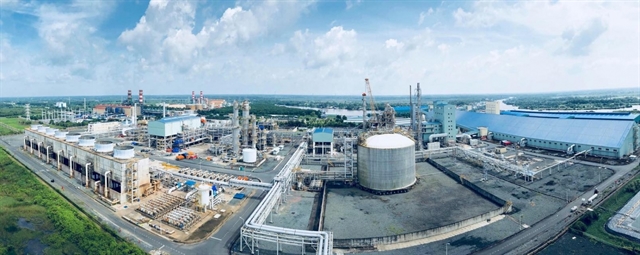Solutions outlined for LNG power development in Master Plan VIII
Việt Nam stands as a nation with abundant favourable prospects for liquefied natural gas (LNG) power, which has caught attention from numerous enterprises and investors, heard a forum held by the Việt Nam Chamber of Commerce and Industry (VCCI)’s Business Forum magazine in Hà Nội last week.
 |
|
A view of Cà Mau Gas - Electricity - Fertiliser Industrial Park. — Photo moit.gov.vn |
HÀ NỘI — Việt Nam stands as a nation with abundant favourable prospects for liquefied natural gas (LNG) power, which has caught the attention of numerous enterprises and investors, heard a forum held by the Việt Nam Chamber of Commerce and Industry (VCCI)’s Business Forum magazine in Hà Nội this week.
The forum aimed to realise the goals of LNG power development as outlined in National Power Development Plan VIII for the 2021-30 period.
Economist Ngô Trí Long proposed that the Government promptly approve plans to lay the groundwork for implementing energy projects, and relevant State authorities establish special mechanisms for LNG power development to overcome existing limit ations and meet the schedule.
At the same time, national standards and regulations should be promptly issued for practical application, along with certifications to ensure that equipment procured or produced from abroad complies with current standards, he said, adding that a mechanism is essential to empower LNG power plant operators to directly negotiate electricity sales with consumer households, and the Việt Nam Electricity Group (EVN) is among the entities involved.
Plant operators should have the right to directly purchase LNG, rent storage facilities, and gasify the fuel. Power plants may invest in additional transmission lines. In such a scenario, the electricity selling price will be subject to mutual agreement between the buyer and seller.
Long also called for establishing a stable legal framework and policies related to the importation and consumption of LNG.
Nguyễn Văn Phụng, a senior expert on taxation and corporate management, said it is necessary to clearly affirm that LNG power must operate under a market pricing mechanism. There should be no imposition of artificially low pricing to ensure a low electricity price framework.
In fact, the production cost of LNG power is undoubtedly much higher than those of power generated from natural resources such as coal, solar, wind and hydro. Therefore, a scientifically-based pricing framework for this energy source is needed, drawing on practical experience from countries that have effectively adopted such frameworks, he added.








